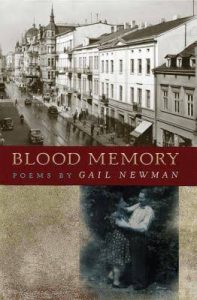 Review by Sandra Anfang
Review by Sandra Anfang
Gail Newman’s new poetry collection, Blood Memory, is an emotionally challenging and essential reading experience. It chronicles the ongoing effects of the Holocaust on the author and her family across generations. By turns arresting, chilling, tender, simple, and heartbreaking, the writing is consistently lean and starkly honest. The narrator leads us through her own childhood, young adulthood, and middle age, faithfully carrying the burden and responsibilities of memory.
Newman is no stranger to poetry or publication. A long-time poet, she has worked as a California poet-teacher with California Poets in the Schools and as the San Francisco program’s coordinator. She co-founded Room, A Women’s Literary Journal, and has worked as a poetry editor, as well as an arts administrator in museums. Her previous poetry collection is One World (Moon Tide Press).
The ash of death and deprivation is omnipresent in these finely-wrought poems, but there’s a subtle taste of honey that seasons the writing, providing balance and the sweetness of belonging. The reader is guided through a museum of mundane objects and invited to hold each one up to the light for scrutiny and contemplation: a crust of bread, a cloth coat, a colored kerchief, torn shoes. Each object becomes a potent mnemonic symbol in this narrative of life lived at the level of subsistence.
The book consists of three sections. The first, “Blood Memory” is a chronicle of daily life for Newman’s parents in the Lodz ghetto in Poland, as they watch relatives and neighbors taken away to the camps. In “Exile,” the author recounts a train trip from the camps back to Lodz, in her parents’ words: “God pushed us forward like someone shoving / at the back of a line. What were we waiting for? / Soup. Bread. We found any way home” 17.
The second section, “Lost Language,” begins with the author’s birth and early childhood. We learn about her parents’ lives, along with her. The poem, “I Came into the World,” cements the author’s role as the chronicler of her family’s ordeal and survival. “I came into a house where I was a stranger / and was made welcome” (Newman 25). Yiddish words and phrases pepper the poems which comprise a hemorrhage of adult memories, night terrors, and retellings that begin when the children go to bed. Trauma and redemption are present at table, visible in the keenly-observed details of the way the author’s father cuts bread, walks, and holds his body.
The final section, “Living with the Dead,” depicts visits with Newman’s departed father, her mother’s stroke, and visits to Auschwitz and the family cemetery. In the poem “Valentine’s Day,” Newman’s mother has the last word: “My mother, who knows the brutal world, / who survived while others did not, / says, Me? I had it easy 54-55.
Blood Memory delivers on its promise, presenting us with a chillingly authentic experience of the Holocaust from ground zero, through the eyes of the author, her parents, and her extended family. It is a chronicle of suffering, survival, and sweet resilience, reminding the reader of the strength that human beings are capable of in the face of unspeakable atrocities. There are moments of joy to be found throughout this profound collection of poems, hiding in the darkest corners of human experience.
Blood Memory by Gail Newman
Marsh Hawk Press, 2020, $15 (paper)
ISBN 9780996991193
Sandra Anfang is a poet, editor, and poetry teacher. Her published poems appear in numerous print and online journals. She is the author of two chapbooks from Finishing Line Press (2016 and 2018) and Xylem Highway, a full-length collection from Main Street Rag (2019).
